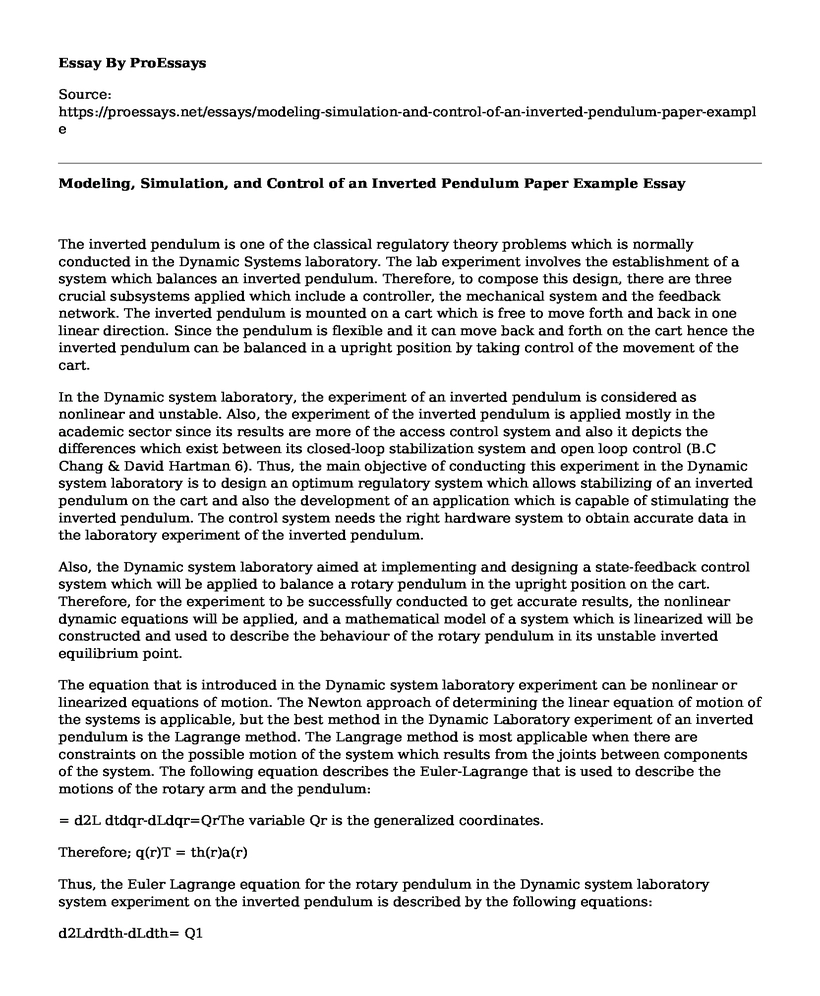The inverted pendulum is one of the classical regulatory theory problems which is normally conducted in the Dynamic Systems laboratory. The lab experiment involves the establishment of a system which balances an inverted pendulum. Therefore, to compose this design, there are three crucial subsystems applied which include a controller, the mechanical system and the feedback network. The inverted pendulum is mounted on a cart which is free to move forth and back in one linear direction. Since the pendulum is flexible and it can move back and forth on the cart hence the inverted pendulum can be balanced in a upright position by taking control of the movement of the cart.
In the Dynamic system laboratory, the experiment of an inverted pendulum is considered as nonlinear and unstable. Also, the experiment of the inverted pendulum is applied mostly in the academic sector since its results are more of the access control system and also it depicts the differences which exist between its closed-loop stabilization system and open loop control (B.C Chang & David Hartman 6). Thus, the main objective of conducting this experiment in the Dynamic system laboratory is to design an optimum regulatory system which allows stabilizing of an inverted pendulum on the cart and also the development of an application which is capable of stimulating the inverted pendulum. The control system needs the right hardware system to obtain accurate data in the laboratory experiment of the inverted pendulum.
Also, the Dynamic system laboratory aimed at implementing and designing a state-feedback control system which will be applied to balance a rotary pendulum in the upright position on the cart. Therefore, for the experiment to be successfully conducted to get accurate results, the nonlinear dynamic equations will be applied, and a mathematical model of a system which is linearized will be constructed and used to describe the behaviour of the rotary pendulum in its unstable inverted equilibrium point.
The equation that is introduced in the Dynamic system laboratory experiment can be nonlinear or linearized equations of motion. The Newton approach of determining the linear equation of motion of the systems is applicable, but the best method in the Dynamic Laboratory experiment of an inverted pendulum is the Lagrange method. The Langrage method is most applicable when there are constraints on the possible motion of the system which results from the joints between components of the system. The following equation describes the Euler-Lagrange that is used to describe the motions of the rotary arm and the pendulum:
= d2L dtdqr-dLdqr=QrThe variable Qr is the generalized coordinates.
Therefore; q(r)T = th(r)a(r)
Thus, the Euler Lagrange equation for the rotary pendulum in the Dynamic system laboratory system experiment on the inverted pendulum is described by the following equations:
d2Ldrdth-dLdth= Q1
2Lr-L=Q2
In this case, the Lagrangian value of the system will be described as:
L=R-V
R- represents the total kinetic energy of the system and V- is the total potential energy of the system. Therefore, the Lagrangian equations are used to give the difference between a system`s potential energy and kinetic energy.
Moreover, the system is necessary to be linearized about a desired operating point due to the purpose of control design. For instance, hoe to linearize a two-variable nonlinear equation functions, e.g. f(Q), lets define the variable Q as:
QT= [Q1 Q2];
and f (Q) needs to be linearized about its desired operating point.
QT0= [ab]
Thus, the linearized function of the nonlinear equation is given the following function:
Flin = f(Qo)+ [f(Q)Q1]Q=Q0 (Q1-a) + [f(Q)Q2]Q=Q0 (Q2-b)
Work cited
MEM 351- Lab III Modeling, Simulation, and Control of an Inverted Pendulum by B.C Chang, David Hartman, Drexel University, January 2017.
Cite this page
Modeling, Simulation, and Control of an Inverted Pendulum Paper Example. (2022, Jul 08). Retrieved from https://proessays.net/essays/modeling-simulation-and-control-of-an-inverted-pendulum-paper-example
If you are the original author of this essay and no longer wish to have it published on the ProEssays website, please click below to request its removal:
- Essay Sample on Reservoirs Analysis
- The Netherland's Geographic Profile: Research Paper
- Solving Sudoku Research
- The Role of Latent Heat While Phases Are Changing Paper Example
- Joseph Louis Lagrange Essay Example
- Durban South Africa Paper Example
- Essay Example on Exploring Appalachia: A Region of Contrasts and Disadvantage







